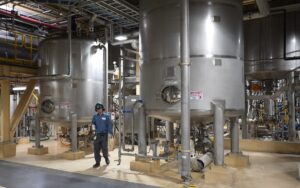The EV project funding, which involves 10 companies, is part of a new $59-million, 15-project package spanning four NGen advanced manufacturing programs

More than half of the new funding announced by NGen is supporting five projects in its EV Manufacturing Value Chain Program. One of the funding recipients is Vancouver-based Nano One Materials. Photo: Nano One
The EV project funding, which involves 10 companies, is part of a new $59-million, 15-project package spanning four NGen advanced manufacturing programs
Next Generation Manufacturing Canada (NGen) has announced a $40-million investment in five new advanced manufacturing projects, involving 10 companies, under the umbrella of its Electric Vehicle Manufacturing Value Chain Program.
NGen’s share of that program investment is $13.5 million, with the remaining $26.5 million leveraged from industry partners.
The EV project funding is part of a larger, $59-million advanced manufacturing investment announced Tuesday involving 15 new projects and 31 companies across Canada. Of that total, $21.4 million is from NGen and $37.4 million is from industry.
The non-EV projects fall under NGen’s Commercialization of Quantum Technologies (National Quantum Strategy) and Moonshot for Mining, Minerals, and Manufacturing (Canadian Space Agency) funding programs.
NGen is an industry-led non-profit that leads Canada’s Global Innovation Cluster for Advanced Manufacturing.
The EV Supply Chain program launched in May 2023. It aims to help Canada fully capitalize on large-scale domestic and international investments in its growing EV sector.
“Through NGen’s collaborative approach to innovation, we’re creating private and public sector partnerships across provincial boarders that are driving disruptive innovations and building world leading advanced manufacturing capabilities in Canada,” said Jayson Myers, CEO of NGen, in a press statement.
First-time NGen funding recipient
The 10 companies getting NGen support in the EV Value Chain Program are paired in five different projects.
One of the pairs of funding recipients is Nano One Materials and Worley Chemetics, both of Vancouver. NGen awarded the two companies $2.8 million, according to a Nano One press release.
Nano One is developing a “One-Pot” technology process to produce more streamlined, less expensive, less energy-intensive, environmentally friendly cathode active materials for lithium-ion batteries.
This is the first time the company is receiving funding from the Canadian innovation cluster.
“It’s great to have the support from NGen,” Dan Blondal, the CEO of Nano One Materials, tells Electric Autonomy in an interview.
“Getting NGen’s backing provides a ton of confidence to our shareholders. Their support is valuable and recognizes all of the accomplishments that Nano One has made, including all the big international partners that we brought to the table and our progress in meeting business objectives.”
Nano One and Worley Chemetics plan to use the NGen funding to advance their recently announced partnership. The two companies plan to produce equipment — tanks, reactors, furnaces and kilns — for Nano One’s “One-Pot” cathode process at Worley’s alloy fabrication shop in Pickering, Ont.
“This equipment will be part of a larger package with Worley, which also includes the engineering packages, the intellectual property, access to the patents and all the know-how of our various teams,” says Blondal.
The larger business strategy is to license and sell this design package to other battery companies.
Other new funding recipients
NGen is also supporting the following eight companies with their EV-related projects:
- Dana Canada (Oakville, Ont.) and KA Imaging (Waterloo, Ont.) are receiving funding for advanced manufacturing processes for EV power electronics heat exchangers;
- Flex-Ion Battery Innovation Center and SPM Automation (both Windsor, Ont.) are being funded for lithium-ion battery innovations and integrated systems for next-generation EVs;
- Green Graphite Technologies (Montreal) and Calumix Technologies (London, Ont.) are developing projects focused on recycling graphite from secondary sources for use in lithium-ion batteries; and
- Plasmagear (Montreal) and Ionomir Innovations (Vancouver) are working on projects for sustainable and high-performance fuel cells used in electric vehicle propulsion systems.
Beyond the EV supply chain, through the Commercialization of Quantum Technologies program, NGen is allocating $14.1 million to nine companies, combining $5.6 million from NGen with $8.5 million in industry contributions.
Additionally, 12 companies will receive $4.6 million in support under the Moonshot for Mining, Minerals, and Manufacturing initiative, funded equally by NGen and industry.
To date, NGen has approved 211 Cluster projects with 483 industry partners and 313 research groups from across Canada. As a result of these initiatives, NGen says that 66 new companies and 3,901 direct jobs have been created.






